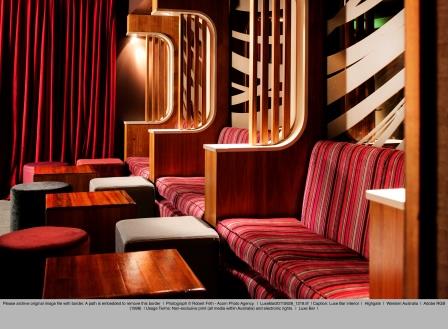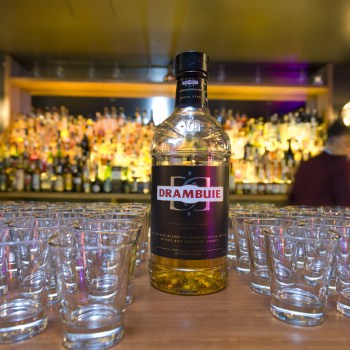By Sacha Delfosse
After spending the last three or so years as editor of bars&clubs, in May this year I made the move from Sydney to Perth. Soon after I was lucky enough to be given the chance to manage one of Perth’s iconic cocktail venues, Luxe Bar.
Having last managed a venue in 2004, to say there was a lot to learn is an understatement. While many of the key hospitality principles remain the same, the industry has evolved in folds since I left it.
While the crafting of quality cocktails is now an all important part of most premium bars in this country, and most bartenders worth their weight in gomme have a great understanding of all the spirit categories and an array of classic and contemporary cocktails, one thing I have quickly discovered is that there is a great deal more to operating a successful bar than just having a kick-ass drinks menu and a back bar that’s the envy of your peers.
Speaking of back bars, and speed rails for that matter, stock control is the back bone to any bar operation. You can’t sell what you haven’t got, and if you’re not selling what you have then sooner or later you’ll hit cash flow problems.
Because Luxe Bar isn’t one of those venues that specializes in a specific category, the challenge is to have a limited selection of spirits from each category that cuts across styles, price points and marketing activity.
Some brands people love (even if bartenders are not fond of them), other brands go from obscurity to flavour of the month, some brands might not be that well known but allow the bartenders to craft awesome drinks from them or give the consumer something different to sink their taste buds into.
Not everyone that comes to your bar will want to be educated on the nuances of different rum styles, or care much for the back story behind the mezcal on your shelf. Many people just want a good drink at an affordable price to help them enjoy their night out.
Learning the hard way
My first weekend as manager was also a long (public holiday) weekend and, while I ordered stock according to the par levels given to me by the previous manager, I forgot to factor in the increase in consumption a long weekend (and a large function we held that weekend also) would bring.
By Sunday I found we were running very low on one of our staple products – vodka – as well as having drenched my beer supplies. Luckily I was able to get help from many of our neighbouring Beaufort Street bars, who kindly lent me enough stock to avoid running out. I literally had bartenders showing up with a spare bottle or two of vodka as they finished their shifts. Great solidarity, but not good for business.
I quickly learnt you need to quickly identify the top selling items in your bar and always make sure you have some extra on hand. That said, having too many bottles of products that move slow in your storeroom can be detrimental, as that is dead money, just sitting there for weeks – or months – on end.
Since most bars are small businesses, having thousands of dollars locked up in stock is something all owners want to avoid, as that money can be (and will probably be) used for other things – in many cases for maintenance and repairs of key equipment that is crucial to the business.
Equipment and staff
This brings me to my next point – the importance that items like refrigerators, lighting, glass washers, ice machines, tills, EFTPOS terminals, amplifiers, etc. play in keeping a bar running smoothly.
If any of these things, and many other elements of a bar, stop working, you soon find out how crucial they are. Things break down all the time, and sometimes with a bit of ingenuity, luck or help you can get through the shift without them, but they will eventually need to get fixed and this will cost you time and money.
Having reliable trades people that can come out and fix a faulty fridge or rewire your sound system at a moment’s notice is a blessing, but it’s a must to have systems in place to ensure all the bits and pieces that make your bar work are running smoothly.
Staffing is another area a manager will have to spend a lot of time worrying about. It’s no revelation that people come and go much quicker in hospitality than in other industries. The challenge is finding the right people for your venue, making sure they are happy, and that they stick around as long as possible.
Even if people are happy they may still need to leave due to other factors, so making sure no one is irreplaceable is a smart way to approach things. I don’t mean this in a negative way, but if only one person on your team knows how to operate a certain piece of equipment or do a certain function and they leave, you will be screwed.
Once you find a team that works well together, it’s important to encourage everyone to learn from each other and provide the time, resources and direction for your staff to learn as much as they can.
Get your head around the data
One great advantage of the current hospitality industry now as opposed to a decade ago is the improvement in technology, especially when it comes to POS. The days of X and Z Read are long gone and now with a push of a button or two I can see what’s been sold, when it was sold, how much was sold over a certain period, and even who sold it.
The amount of data available now is a touch overwhelming but is worth getting your head around as it can save you a lot of time and hassle in the long run. It can also help you see the business in a different light, as numbers rarely lie. Seeing where your revenue is coming from and where it is going allows you to establish better practices to maximize profits and lower costs – and that makes everyone happy.
When I started working at Luxe Bar I tried to spend as much time behind the bar as possible, to get my head around the venue and dust off the old cobwebs. But I soon realised to be an able manager I needed to spend just as much time in the office. Working on spreadsheets, notes, reports, rosters, ordering forms, planning documents, etc. will consume a great deal of your time, but are necessary to make sure your bar is operating correctly. Staying organized and on top of your paperwork makes a huge difference in the long run.
There are so many more factors that can shape a patron’s experience and image of your bar – from the way the security interact with them at the door, to the décor and lighting, the cleanliness of the bar, the state of your glassware, the bartenders’ attire, and much, much more.
Serving someone the best Martini they had in their life will be diminished if they walk into the toilets and find they are a mess. Having a bartender drop gold-plated chat to a patron will quickly lose its charm if the beer they serve them is warm, the music too loud or the air-con too cold. Every little thing counts.



